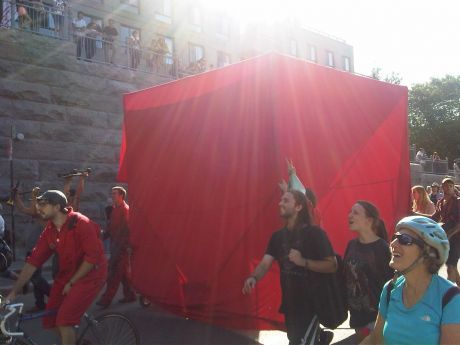News
You are here
100,000 demonstrate as Quebec Spring continues

October 5, 2012
On August 22, the Quebec student movement marked the 6th-month anniversary of the start of the massive and persistent strike against tuition hikes and neoliberal austerity, with a 100,000- strong celebration of resilience.
It was all the more impressive as it followed on a series of votes in Quebec universities and colleges to renew the strike mandate that met with mixed results, and most likely a return to class.
The force of the threat posed by the Special Law, particularly to impose massive fines on student unions, left students with an impossible choice: to continue the strike indefinitely (for which there was undoubtedly much support despite the prospect of losing the entire academic year), but in doing so, to possibly put the infrastructure of the student movement at risk.
The best course of action when one has to engage in a tactical retreat is to show very visibly that it is a choice, and not a sign of weakness. The colleges who voted in mid-August did just that, by voting for an all-out strike for one day, and that day was August 22.
All the colleges, though ordered back in session by the Special Law, were shut down that day, and 100,000 students, professors and supporters filled the streets. The march was in no way deflated, and not even driven by anger, but by confidence and jubilation. A whole series of flags had been printed that read: “Historic movement, historic victory.”
This might seem at odds with a return to class in the face of state repression, and the failure to stop the hike. But there was a similar battle of interpretation after the UK student revolt last year, which didn’t stop the tuition hike but did crack the austerity consensus and influenced large numbers beyond the students. The Quebec movement has accomplished that on a massive scale, and as in the UK, has also produced a new generation schooled in militant and radical politics.
The media said things like: “For a few hours, it felt like spring had returned to the streets of Montreal.” It was dubbed a “reunion” of the movement. The rally MC at the end of the march said simply: “We are numerous. Bravo! Well done.”
The speakers were not identified as officially representing student organizations or trade unions, which seemed to be a way to avoid running afoul of the Special Law. But community organizations filled the gap: although the main student association behind the strike, CLASSE, was a key organizer of the demo, their name did not appear on the poster. Instead, a coalition that had been started by 120 community organizations prior to the strike, called “Coalition against user fees in public services” lent its name to the event.
Under the banner of this coalition another mass demo has been advertised. But this time it will not be on the 22nd of the month, as the protests have been up till now, marking the start of the strike. It will be on the 4th of October, which will be the one-month anniversary of the Quebec election that takes place September 4.
The election ushers in a new context for the movement. All eyes will have to be kept on ensuring that, no matter who is elected, the voices of the Quebec Spring and the Red Square continue to define the political terrain into the future.
Section:
- Log in to post comments










